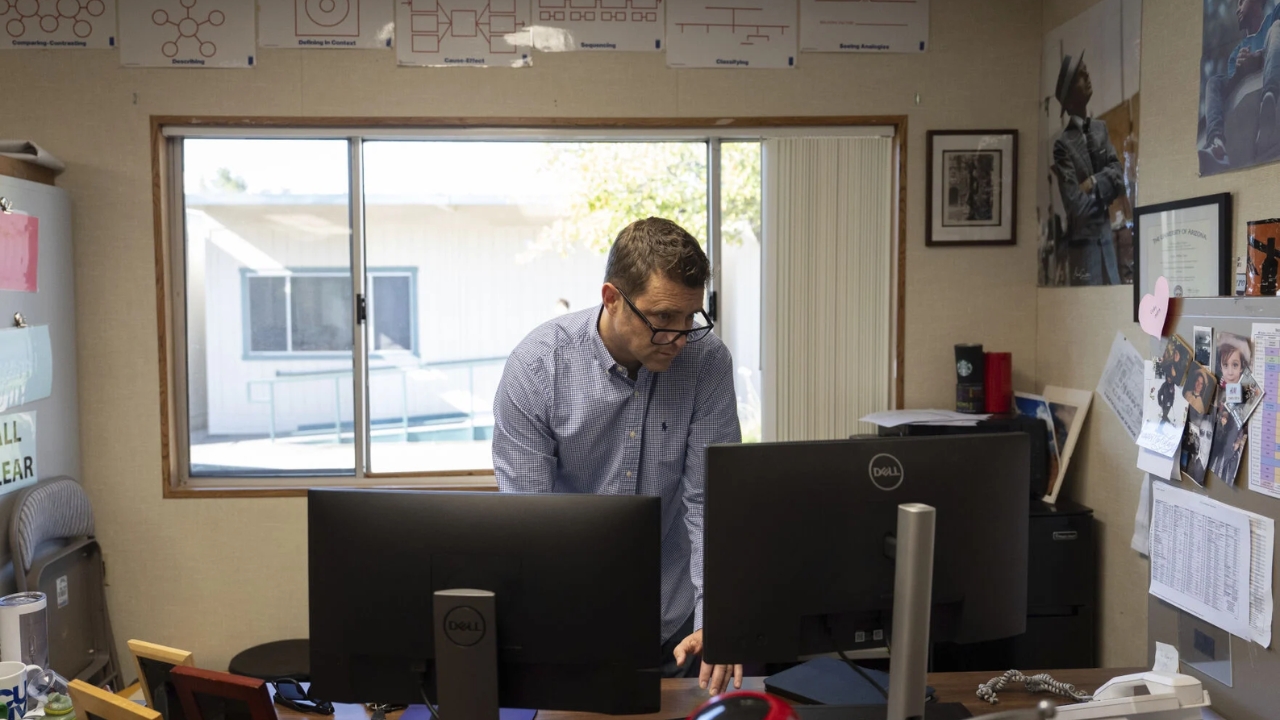
DOJ Subpoenas Challenge Federal Reserve's Autonomy
Jerome Powell cautions that DOJ's subpoenas could undermine the Federal Reserve's independence and d

Photo: AP
In the past few years, schools and colleges have faced many new problems. But now, one of the biggest challenges is AI cheating. Artificial intelligence tools like ChatGPT and other writing programs are becoming very popular. Many students are using these tools to finish homework, essays, and assignments. Some even use AI during exams. This has created a serious debate among teachers, parents, and school leaders about how to deal with this new issue.
The Rise of AI in Classrooms
When AI programs first became available, many students were excited. These tools could write essays, solve problems, and even explain hard subjects in simple words. For students who found it difficult to write or who were under pressure to finish a lot of homework, AI seemed like a helpful friend.
But soon, teachers began to notice something unusual. Students were turning in assignments that looked very polished but did not sound like their own writing. Some papers used complex words that the student had never used before. Others were written in a style that seemed more like a computer than a teenager.
This raised suspicion, and many teachers started to believe that students were using AI to cheat.
Why Students Turn to AI
There are many reasons why students rely on AI tools. Some feel stressed about grades and want to make sure they don’t fail. Others say they are overloaded with homework and do not have enough time to do everything on their own.
For example, a high school student might have sports practice, part-time work, and several assignments due in the same week. Instead of staying up all night, the student might copy questions into an AI tool and get instant answers.
Some students also say that AI helps them understand difficult topics. They argue that using AI is not really cheating but a form of “extra help.” However, the line between help and cheating has become blurry, and that’s what makes it such a big problem.
How Schools Are Responding
Schools across the United States are trying different ways to respond to AI cheating. Some have banned the use of AI tools completely. Teachers in these schools warn students that if they are caught using AI, they will face strict punishment, such as failing the assignment or even the class.
Other schools take a different approach. Instead of banning AI, they try to teach students how to use it responsibly. They want students to see AI as a learning tool, not a shortcut. For example, some teachers allow students to use AI to brainstorm ideas but not to write the full essay.
Some universities are even creating new rules about academic honesty. They are updating their policies to include AI, making it clear that submitting work generated by a computer is considered plagiarism.
The Role of Technology
To fight AI cheating, schools are also turning to technology. Several companies have developed software that claims to detect whether a piece of writing was created by AI. These programs analyze text and look for patterns that are common in machine writing.
However, these tools are not always reliable. Sometimes they wrongly accuse a student of cheating even when the work is original. This creates another problem: how can teachers be sure when someone has really cheated?
Because of this, many schools are choosing to focus more on teaching and trust rather than depending only on detection tools.
Impact on Teachers
For teachers, AI cheating is frustrating. They spend hours preparing lessons and grading assignments, only to find out that some students are taking shortcuts. It can feel unfair when hardworking students put in effort, while others simply copy answers from a machine.
Many teachers also worry about what students are losing by relying on AI. Writing essays is not just about finishing homework. It is about learning how to think, analyze, and express ideas. If students skip this process, they may miss important skills that they will need later in life.
A college professor recently shared that she could tell when students used AI because their writing sounded “flat.” It had perfect grammar but no personal touch, no original thought. “Good writing shows the voice of the writer,” she explained. “AI doesn’t have that.”
Concerns from Parents
Parents are also divided on this issue. Some parents believe that using AI is no different from using calculators, spell-checkers, or online search engines. They see it as part of the modern world.
But other parents worry that their children are becoming too dependent on technology. They fear that kids may not learn how to think critically or solve problems on their own if they always depend on AI.
Students Speak Out
Interestingly, not all students support AI cheating. Many students who work hard feel frustrated when their classmates use AI to get ahead. They think it is unfair and that it devalues their own hard work.
One high school senior said, “I spend hours writing my essays, and then I hear that someone else just copied answers from a computer. It makes me feel like my effort doesn’t matter.”
Other students admit that they sometimes use AI, but only for small tasks like fixing grammar or checking spelling. They argue that the real problem is when students use AI to write entire assignments without learning anything themselves.
The Bigger Picture
The debate over AI in schools is not just about cheating. It also raises larger questions about the future of education. Technology will keep advancing, and AI will become even smarter. That means schools need to think carefully about how to prepare students for a world where AI is everywhere.
Instead of fighting against AI completely, some experts suggest teaching “AI literacy.” This means helping students understand how AI works, what it can do, and what its limits are. If students learn to use AI wisely, they can benefit from it without falling into the trap of cheating.
Looking Ahead
As AI continues to grow, the challenge for schools will be finding the right balance. Banning AI completely may not work, because students will still find ways to use it secretly. But ignoring the problem is also not an option.
The solution may lie in creating new types of assignments that are harder for AI to handle. For example, teachers may ask students to connect lessons to their personal experiences, or they may hold more in-class discussions and presentations where AI cannot replace real human thinking.
At the same time, students will need to understand that while AI can be a useful tool, it cannot replace their own effort. Success in school and in life requires real skills that no computer can give.
AI cheating has become one of the most talked-about problems in schools today. Students, teachers, and parents all have strong opinions, and there is no simple answer. What is clear, however, is that education must adapt.
AI is not going away. The question is whether schools can turn it into something positive instead of letting it damage trust and learning. Teachers want students to use their own minds, parents want their children to grow strong skills, and students want fair chances. Finding the middle ground will take time, but it may also lead to a new way of learning that prepares students for the future.